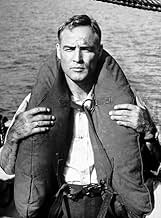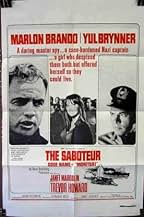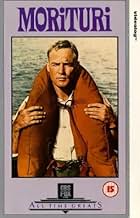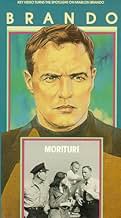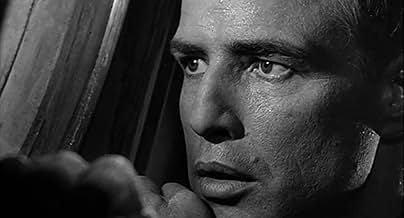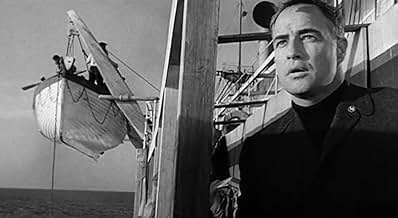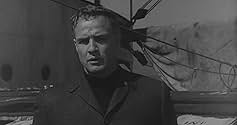Morituri
- 1965
- Tous publics
- 2h 3min
NOTE IMDb
7,0/10
4,8 k
MA NOTE
Un militant pacifiste se voit obliger de se faire passer pour un officier SS et désactiver les explosifs de sabordage sur un cargo transportant une cargaison en caoutchouc que les Alliés veu... Tout lireUn militant pacifiste se voit obliger de se faire passer pour un officier SS et désactiver les explosifs de sabordage sur un cargo transportant une cargaison en caoutchouc que les Alliés veulent capturer.Un militant pacifiste se voit obliger de se faire passer pour un officier SS et désactiver les explosifs de sabordage sur un cargo transportant une cargaison en caoutchouc que les Alliés veulent capturer.
- Réalisation
- Scénario
- Casting principal
- Nommé pour 2 Oscars
- 2 nominations au total
Oscar Beregi Jr.
- Admiral
- (as Oscar Beregi)
Avis à la une
Morituri is by no means a flawless masterpiece, but it is a good film. The problem is, because of a somewhat intricate plot you have to watch it a couple of times to understand it. Some parts of the film are dull, especially some of the engine room scenes where there is relative silence--only the noise of the engine room is heard, but it is also gripping at times. I decided to give this film another shot-and I'm glad I did. I found that it is quite interesting, after you watch it a couple of times you understand the purpose of Brando's character in the film. He is great in this film, his accent is flawless and he looks just great--I wish he would have done more action-oriented films. The cinematography is also great, and I absolutely loved the musical score. Hopefully, people will give this movie a chance and see that Brando did do a few good films in the 60's and stop giving him a bum rap.
The highlight of this movie set on a German cargo ship during the Second World War are the superb performances offered by Marlon Brando and Yul Brynner. Brando plays a German expatriate (disguised as a Swiss national) who's living in British ruled India in 1942. He ends up being drafted (very much against his will) by the British to go undercover as SS agent Keil to divert the cargo ship (which is carrying a very valuable - to both sides - cargo of rubber) into American hands. Brynner plays Mueller - the ship's captain - a man with a drinking problem trying to regain his reputation after having a ship torpedoed out from under him while he was drunk, but a man who's also no fanatical Nazi.
Both are very believable in their roles. There's also a strong performance from Martin Benrath as First Officer Kruse - who is a fanatical Nazi, who doesn't trust his captain, and who's as happy to have an SS officer on board as the captain is unhappy about it.
The movie is always interesting. It's not an action movie in the modern sense of the word, but it's increasingly tense as suspicion grows about Keil, and as the ship awaits a report from Berlin about him. As good as Brando and Brynner and even Benrath are, though - and as tense as the movie becomes about whether Keil's real identity will be uncovered - the most powerful part of the movie might have come in a scene featuring Janet Margolin. She played a Jewish medical worker who was taken prisoner along with a number of American sailors when their ship is sunk by a U- boat. Speaking with Keil as he tries to convince her that he's on her side, his SS identity notwithstanding, she recounts - in surprisingly and uncomfortably (even for today, and so shockingly so in 1965) graphic detail - her abuse at the hands of the Gestapo. Without going into detail, the words "hour after hour after hour" are haunting. It was a truly sobering scene. You can't watch it and not find yourself in sympathy with a character who otherwise really isn't that central to the overall story.
This is, overall, a very good movie with a very strong cast. (8/10)
Both are very believable in their roles. There's also a strong performance from Martin Benrath as First Officer Kruse - who is a fanatical Nazi, who doesn't trust his captain, and who's as happy to have an SS officer on board as the captain is unhappy about it.
The movie is always interesting. It's not an action movie in the modern sense of the word, but it's increasingly tense as suspicion grows about Keil, and as the ship awaits a report from Berlin about him. As good as Brando and Brynner and even Benrath are, though - and as tense as the movie becomes about whether Keil's real identity will be uncovered - the most powerful part of the movie might have come in a scene featuring Janet Margolin. She played a Jewish medical worker who was taken prisoner along with a number of American sailors when their ship is sunk by a U- boat. Speaking with Keil as he tries to convince her that he's on her side, his SS identity notwithstanding, she recounts - in surprisingly and uncomfortably (even for today, and so shockingly so in 1965) graphic detail - her abuse at the hands of the Gestapo. Without going into detail, the words "hour after hour after hour" are haunting. It was a truly sobering scene. You can't watch it and not find yourself in sympathy with a character who otherwise really isn't that central to the overall story.
This is, overall, a very good movie with a very strong cast. (8/10)
In 1942 Japan, the Germans are desperate to open the shipping lanes between Japan and Germany. German Captain Mueller (Yul Brynner) is still being blamed for having a drink before getting torpedoed in his last assignment. He is bitter at his son's treatment by the military brass. There is a shortage of manpower and Mueller is forced to take on prisoners pressed into service. He is transporting a valuable load of rubber destine to supply the German war machine for three full months. In India, German deserter Robert Crain (Marlon Brando) is recruited by British intelligence. They expect any approach by the Allies would immediately set Mueller to scuttle the ship. While pretending to be an SS official, Crain is tasked with surreptitiously disabling the scuttling charges and thereby securing the cargo for the American Navy.
The sneaking around in the bowels of the ship is not the most compelling. The secret meeting with the German prisoners is when the drama really starts. There is a bit of awkwardness with Mueller's views. One would expect him to hide his disdain much better. I like the interrogation scene with the two visiting officers. The problem does resolve itself pretty quickly and I really like the hospital ship reveal. It's a compelling fight to the finish. Brando is doing well. Brynner is acting a little too much although his role is calling for it. The action could be better. Overall, it's a solid thriller.
The sneaking around in the bowels of the ship is not the most compelling. The secret meeting with the German prisoners is when the drama really starts. There is a bit of awkwardness with Mueller's views. One would expect him to hide his disdain much better. I like the interrogation scene with the two visiting officers. The problem does resolve itself pretty quickly and I really like the hospital ship reveal. It's a compelling fight to the finish. Brando is doing well. Brynner is acting a little too much although his role is calling for it. The action could be better. Overall, it's a solid thriller.
I stumbled across MORITURI in a Virginia Blockbuster; I've never seen it for rent anywhere else. I noticed that it had Marlon Brando and Yul Brynner, so I thought it had to be worth a try. And so I saw what turned out to be one of the top 20 World War II movies I've ever seen. That's right, up there with PATTON, THE YOUNG LIONS, and the like.
Brando plays Robert Crain, who is assigned to go undercover on board a German freighter transporting a cargo of rubber to the war zone. He must impersonate a Nazi to do this, and must face some hard choices as to how cruel he can be to appear realistic. Brynner is Muller, the captain of the freighter who has accepted the job as his last chance to save his career in the German merchant marine. He is fair and compassionate and must rein in the fanatical Nazi second-in-command that his superiors have appointed for him. En route, the freighter picks up the survivors of a U-boat, including Esther (Janet Margolin) a beautiful young concentration camp survivor who is so brimming with hatred and vengefulness that she can no longer even accept human compassion.
Brando is very good in his role, but he is completely upstaged by Brynner, who gives the performance of a lifetime. His conflict, between his patriotism and self-preservation on the one side and the vileness of what the Nazis are doing to him and to his country on the other, is marvelously realized. The movie also features a beautiful exchange between Brando and one of the passengers - "I was a political prisoner." "Falsely accused, of course." "No. Not falsely accused." (smiles). I have a soft spot for movies where adversaries come to respect each other, and MORITURI is one of the best of that type.
Good luck finding this movie. It's a true diamond in the rough.
Rating: ***1/2 out of ****.
Brando plays Robert Crain, who is assigned to go undercover on board a German freighter transporting a cargo of rubber to the war zone. He must impersonate a Nazi to do this, and must face some hard choices as to how cruel he can be to appear realistic. Brynner is Muller, the captain of the freighter who has accepted the job as his last chance to save his career in the German merchant marine. He is fair and compassionate and must rein in the fanatical Nazi second-in-command that his superiors have appointed for him. En route, the freighter picks up the survivors of a U-boat, including Esther (Janet Margolin) a beautiful young concentration camp survivor who is so brimming with hatred and vengefulness that she can no longer even accept human compassion.
Brando is very good in his role, but he is completely upstaged by Brynner, who gives the performance of a lifetime. His conflict, between his patriotism and self-preservation on the one side and the vileness of what the Nazis are doing to him and to his country on the other, is marvelously realized. The movie also features a beautiful exchange between Brando and one of the passengers - "I was a political prisoner." "Falsely accused, of course." "No. Not falsely accused." (smiles). I have a soft spot for movies where adversaries come to respect each other, and MORITURI is one of the best of that type.
Good luck finding this movie. It's a true diamond in the rough.
Rating: ***1/2 out of ****.
Morituri (1965)
I had no expectation here. The name was odd. And the description was odd--a WWII film from the point of view of the enemy. Sort of. And so I didn't really think I'd be fully captive.
And I was. This is a special film war film. For one thing it has Marlon Brando being his arrogant best, and Yul Brynner, too. It presents an odd dramatic situation, a tension between strong willed characters who don't quite know what the other is up to. Here I mean Brando playing a German plant on this ship going from Japan to Europe, and Brynner, the captain, a disgruntled German with some experience both with the wheel and the bottle.
The ship is a modern (1942) Japanese ship, and among the crew are a bunch of political prisoners, who of course can't be totally trusted. The cargo is rubber, the most sought after material in the early war (later it would be uranium, I suppose).
Cinematographer Connie Hall is quite aggressive and brilliant with his photography, keeping the angles and movement nearly constant. The light is dramatic, the sharpness clean. And he got nominated for an Oscar for his work. The interior of the ship is large and filled with strange turns, great heights, lots of interior and exterior spaces that take you by surprise. Beautiful stuff.
The plot moves more quickly than you'd expect, too, with little surprises and turns, like finding a burning American ship at night and rescuing survivors. One of these is a young woman who was born in Berlin and they question her--why is a German on an enemy ship? And she says she is not German. And they ask what is she? You expect here that she might say she was American, but even better she says, "I am anti-German."
The script is tight and believable. The scenario, which is not formed from fact as far as I could discover (it's based on a novel), seems reasonable. And it ends up being more subtle than you'd expect. Yes, there are aspects that are obvious dramatic additions--the one woman who appears, for example, happens to be Jewish--but these end up being ways of showing people's characters. Ultimately that's what this movie is about.
I had no expectation here. The name was odd. And the description was odd--a WWII film from the point of view of the enemy. Sort of. And so I didn't really think I'd be fully captive.
And I was. This is a special film war film. For one thing it has Marlon Brando being his arrogant best, and Yul Brynner, too. It presents an odd dramatic situation, a tension between strong willed characters who don't quite know what the other is up to. Here I mean Brando playing a German plant on this ship going from Japan to Europe, and Brynner, the captain, a disgruntled German with some experience both with the wheel and the bottle.
The ship is a modern (1942) Japanese ship, and among the crew are a bunch of political prisoners, who of course can't be totally trusted. The cargo is rubber, the most sought after material in the early war (later it would be uranium, I suppose).
Cinematographer Connie Hall is quite aggressive and brilliant with his photography, keeping the angles and movement nearly constant. The light is dramatic, the sharpness clean. And he got nominated for an Oscar for his work. The interior of the ship is large and filled with strange turns, great heights, lots of interior and exterior spaces that take you by surprise. Beautiful stuff.
The plot moves more quickly than you'd expect, too, with little surprises and turns, like finding a burning American ship at night and rescuing survivors. One of these is a young woman who was born in Berlin and they question her--why is a German on an enemy ship? And she says she is not German. And they ask what is she? You expect here that she might say she was American, but even better she says, "I am anti-German."
The script is tight and believable. The scenario, which is not formed from fact as far as I could discover (it's based on a novel), seems reasonable. And it ends up being more subtle than you'd expect. Yes, there are aspects that are obvious dramatic additions--the one woman who appears, for example, happens to be Jewish--but these end up being ways of showing people's characters. Ultimately that's what this movie is about.
Le saviez-vous
- AnecdotesMarlon Brando initially refused to go on a press tour to promote the film. The studio threatened him, as he was contractually required to promote the film, so Brando made an appearance at one press conference at which he said, "You will be unable to proceed in life unless you see Morituri." The studio released him from doing more press appearances after this sarcastic statement.
- GaffesTrevor Howard (Colonel Statter) refers to India as a "British dominion" but British India was under direct British rule (and the external affairs of the Indian princely states were dictated by Britain) prior to 1947, when British India became a self-governing dominion. India later became a republic, in 1950.
- Citations
Colonel Statter: [blackmailing Crain] In your case, I'm not troubled by any moral nausea.
- ConnexionsFeatured in A Cinematic Life: The Art & Influence of Conrad Hall (2010)
Meilleurs choix
Connectez-vous pour évaluer et suivre la liste de favoris afin de recevoir des recommandations personnalisées
- How long is Morituri?Alimenté par Alexa
Détails
- Date de sortie
- Pays d’origine
- Langue
- Aussi connu sous le nom de
- Saboteur: Code Name Morituri
- Lieux de tournage
- Sociétés de production
- Voir plus de crédits d'entreprise sur IMDbPro
Box-office
- Budget
- 6 290 000 $US (estimé)
- Durée2 heures 3 minutes
- Couleur
- Rapport de forme
- 1.85 : 1
Contribuer à cette page
Suggérer une modification ou ajouter du contenu manquant


